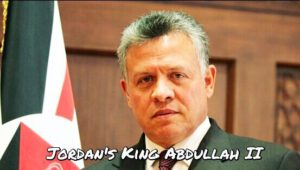by Neville Teller
Various media reports are suggesting that the Jordanian government is intent on urging Israeli Arabs to vote in the November elections, the aim being to keep Benjamin Netanyahu from returning to power. In particular, Jordan is said to have held unofficial talks with Muslim Brotherhood leaders recently, in an attempt to dissuade Raed Salah from boycotting the elections, as the northern branch of the Islamic Movement has historically done.
Raed Salah, a Palestinian citizen of Israel and former head of the northern Islamic Movement, is a prominent religious and political figure who was arrested first in 2017 and then again in 2020. Although charged with *incitement to terror”, eight of the original twelve charges against him were dropped, and his sentence of 28 months imprisonment took into account the 11 months he had been detained awaiting trial. He was released from Megiddo prison in December 2021.
A former mayor of Umm al-Fahm, the popular 64-year-old Salah is known as “Sheikh al-Aqsa” – a title acquired when he was arrested during a demonstration protesting at the installation of metal detectors at the outer gates of the Al-Aqsa Mosque compound, following an attack there.
On August 18 the controversial Middle East Eye, the London-based online news outlet, reported a well-placed, but anonymous, source claiming that Jordanian authorities had been trying to engage with Raed Salah through the Muslim Brotherhood, hoping to persuade him to urge his supporters to participate in the November Israeli elections, or at least not encourage them to boycott them.
This story was partially confirmed by Jordanian journalist Bassam Badarin, who reported some weeks ago in the London-based Al-Quds Al-Arabi newspaper that he had been asked by Jordanian officials about the best way to make contact with Salah. Recently, virtually confirming that the parties had been in touch, Badarin wrote that the main focus of the unofficial talks had been to find ways to increase voter turnout among Palestinian citizens of Israel in the November vote.
“Jordan’s interest,” Badarin is reported as saying, “is similar to that of Lapid and Washington, who do not want to see Netanyahu back in power, since he represents a return to Trump’s ‘deal of the century,’ which was rejected by Jordan.”
However Raed Salah’s media office moved quickly to quash the story. “There is no truth to the media reports that talk about communication between Jordan and Sheikh Raed Salah,” it announced. ”Our position is clear in support of the boycott of the Israeli Knesset elections.”
There is a certain logic in assuming that Jordan’s King Abdullah would prefer to see Yair Lapid returned to government as Israel’s next prime minister, heading a coalition supported by Raam (the United Arab List) but also by other Israeli-Arab parties. However, the idea that Abdullah would seek to manipulate the Arab vote by an appeal to Raed Salah does stretch credulity. Raam, which is associated with the southern branch of the Islamic Movement in Israel, broke from Salah’s northern branch over the very issue of political participation in the Knesset and the Oslo Accords.
The Joint List was formed shortly before the 2015 elections, combining candidates from three Arab parties and the veteran Israeli party, Hadash. The list won 13 seats on that occasion, 13 in the 2019 election, and 15 in 2020. It was prior to the 2021 elections that Raam left the alliance, secured four seats and became part of the coalition government. The Joint List won six and joined the opposition. Jordan may consider its interests are best served by disengaging what remains of the Joint List from its association with Israel’s right-wing coalition.
Few would object if the Jordanians simply choose to encourage Israeli Arabs to vote in the forthcoming elections. However anything which smacked of urging them to vote for a particular party would certainly be deemed unacceptable interference in Israel’s democratic process. It is this aspect of the media reports about Jordan’s recent involvement that is most disturbing.
Yet scraps of evidence in the media do seem to point in that direction. Zaki Bani Irsheed, the former general secretary of the political wing of the Muslim Brotherhood in Jordan, is quoted as saying recent Jordanian actions stem from the desire to “stop Netanyahu from returning to power.” He was referring to a recent visit to Jordan by Khaled Meshaal, head of Hamas’s diaspora office. Jordanian officials and Muslim Brotherhood representatives insisted that Meshaal’s rare visit was purely personal. However, a Muslim Brotherhood spokesperson said this visit was different from previous personal ones in that he “was allowed to meet with Jordanian political and media personalities”.
There are also reports that Jordan has sought to communicate with Mansour Abbas, leader of Raam and deputy head of the southern chapter of the Islamic movement. One commentator asserted “Mansour was recently a guest of King Abdullah twice. One was an official visit, but the other meeting was not announced.”
In short, Amman seems engaged in an effort to reconcile the remaining Joint List with Raam and the southern Islamic branch. Bringing Raed Salah on side seems a lost cause, but regardless of that Jordan may be hoping to ensure that a joint Arab political effort in the forthcoming elections is directed towards tilting the political balance away from Netanyahu, Likud and the Israeli right, and in favor of Yair Lapid and whatever coalition he can muster. If a united Joint List supporting Lapid managed to achieve 15 Knesset seats as in 2020, anything might be possible.


